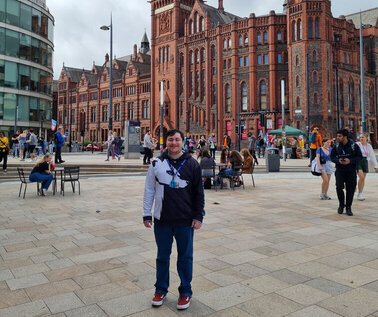Meet Keith, one of our mature undergraduate students, who joined us after completing a foundation year at Carmel College.
Can you tell us a bit about yourself?
Hi, I'm Keith and I’m 27, married and originally from Wallasey. I got my GCSES and A-levels at St Mary’s catholic college in Wallasey village, and then completed a foundation course at the city of Liverpool college in 2013. Since then, I was working, starting in a call centre and then I did 5 years at Asda.
What do you study?
I am studying a BEng in Computer science and Electronic Engineering which included a foundation year at Carmel College.
Did you always have an interest in STEM/ EEE or what inspired you?
I have always had an interest and love of science and technology for as long as I can remember, which seemed to start at 6 months old with my dad and his friend had a pc in bits around me continuing on with a passion for science fiction and then my own love of gadgets and technology.
What made you choose your course at Uni of Liverpool?
I had a choice between computer science or the joint degree im doing now. I chose the joint because I have an interest in soaking up as much knowledge about a field as I can, I love the idea of starting a project from a hardware perspective and continuing to be part of that same project when it goes into its software phase.
How do you find being a mature student?
I feel old haha, even though I’m only 27 knowing that the second years are for example younger than the first Shrek film has made me feel like I’ve added years onto my life, but on another note I’m glad I’m going to university now, because when I was younger I didn’t have the drive or the motivation to do the work, I wont lie, I still struggle with the same issues but I’m in a better place than where I was and working better than I ever had before.
What does your course entail?
From the electronics side, I explore the theory of electrical and electronic circuits, explore the maths skills needed for electrical engineers, and I get to participate in labs, building circuits and making measurements. Currently I only have one computer science module which is an introduction to programming which uses the python language.
What are the best things about your course?
At first, I would have just said the labs and programming but as the weeks have gone on, learning ways to analyse circuits have been at times quite fun as it’s a puzzle that’s needs solving and its quite satisfying to solve.
How has the University of Liverpool/Department of EEE helped you?
For me personally having a foundation programme that led me to pursuing electronic engineering as well as computer science has been the biggest help from the university/dept, I’m now in a place sitting alongside 18 year olds who have gone the traditional route and am able to do this course without the standard qualifications.
What do you think about Electrical Engineering and Electronics and its importance in society?
Society today is determined by advances in electrical and electronic engineering, after all I’m typing this on a computer, in a room with a smart speaker and smart lighting. Where society is getting ‘smarter’ with its use of technology and devices such as 3d printers coming to the home allowing any user to make whatever they want, electrical and electronic engineering are at the heart of this and more.
What do you get up to outside of studying?
Outside of studying I’m a member of a few societies, most notably, the gaming society, coding and robotics society, scouser space society and the mature student’s society. I’m an avid gamer and enjoy watching tv and film when I get the chance to of course and I have a part time job at the guild shop.
What are your future plans?
Hopefully once I graduate, I’ll likely move as my wife has her own aspirations for university. From there I may pursue a Masters or PhD, I’m letting my time at the university to help inspire what I’d like to pursue next in my education and career.
